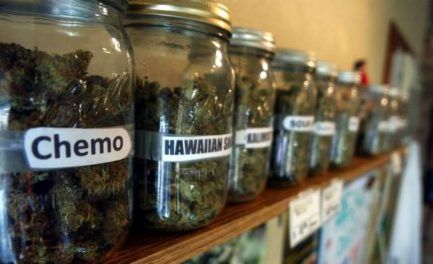With legal pot near, state looks to Trump administration for help on access to banks
 With the legal sale of recreational marijuana a week away, local governments across California have adopted policies on where and when permitted legal sellers can operate, following the ground rules set up by Proposition 64 – the November 2016 state ballot measure legalizing pot for recreational use beginning Jan. 1, 2018.
With the legal sale of recreational marijuana a week away, local governments across California have adopted policies on where and when permitted legal sellers can operate, following the ground rules set up by Proposition 64 – the November 2016 state ballot measure legalizing pot for recreational use beginning Jan. 1, 2018.
But despite more than 13 months of lead time, state officials still haven’t figured out how to deal with a crucial problem: the fact that federally regulated banks can’t accept deposits or have any financial relationship with marijuana vendors or growers, given that pot sales and consumption remain illegal under federal law.
Cash-only medical marijuana dispensaries authorized by a 1996 ballot measure have long been plagued by armed robberies. With recreational pot sales expected to be a multibillion-dollar industry, pot-related crime could skyrocket.
Two separate proposals have emerged after what state officials say are months of discussions.
One under consideration by Gov. Jerry Brown’s administration seems a long shot given that it relies on the cooperation of the Trump administration – specifically Attorney General Jeff Sessions, who has opposed individual states’ efforts to legalize marijuana for recreational use.
The Los Angeles Times recently reported that the state had met with 65 banks and credit unions, as well as with federal regulators, about having one bank in California established as a clearinghouse for all marijuana-related accounts of various banks throughout the state. The “central correspondent” bank would process all transactions involving pot dollars.
Seeking assist from federal government after suing it 24 times
Brown administration officials appeared hopeful that this concept would go over well with federal regulators because, at least in theory, it would make it easier to keep close track of marijuana industry finances, and to spot suspicious payments or transfers of funds.
The problem for California is that this proposal is built on the presumption that the federal government wants to help the state – which has already sued the Trump administration 24 times. While federal regulators have met with state officials on the pot-banking issue, the final decision on whether to cooperate is up to Sessions. At a Nov. 29 press conference, he said his office was taking a hard look at rolling back Obama administration rules that let states allow recreational marijuana after basic public safety and health standards were met.
“It’s my view that the use of marijuana is detrimental, and we should not give encouragement in any way to it, and it represents a federal violation, which is in the law and is subject to being enforced,” Sessions said, according to the McClatchy News Service. “We are working our way through to a rational policy, but I don’t want to suggest in any way that this department believes that marijuana is harmless and people should not avoid it.”
Chiang: Consider setting up a state bank for pot transactions
The second proposal – touted by state Treasurer John Chiang at a Nov. 7 news conference – is to have the state study the feasibility of opening its own bank to deal with marijuana financial transactions. That was based on the recommendations of Chiang’s cannabis bank working group.
The group’s 32-page report also suggested California work with other states in setting up a network of such institutions. But the report noted the many obstacles to establishing such a bank, including the likelihood that it ultimately would still be subject to federal regulation and thus to Sessions’ objections.
Chiang told reporters at his November news conference that “a definitive, bulletproof solution will remain elusive” without changes in federal banking laws.
But the 2018 gubernatorial candidate said that “is not an excuse for inaction.”
Chris Reed
Chris Reed is a regular contributor to Cal Watchdog. Reed is an editorial writer for U-T San Diego. Before joining the U-T in July 2005, he was the opinion-page columns editor and wrote the featured weekly Unspin column for The Orange County Register. Reed was on the national board of the Association of Opinion Page Editors from 2003-2005. From 2000 to 2005, Reed made more than 100 appearances as a featured news analyst on Los Angeles-area National Public Radio affiliate KPCC-FM. From 1990 to 1998, Reed was an editor, metro columnist and film critic at the Inland Valley Daily Bulletin in Ontario. Reed has a political science degree from the University of Hawaii (Hilo campus), where he edited the student newspaper, the Vulcan News, his senior year. He is on Twitter: @chrisreed99.
Related Articles
Gavin Newsom announces new plan calling for housing boom
SACRAMENTO – If the past is any guide, California’s Legislature will declare its recently passed housing-affordability package a success and
East Bay runoff race splits CA Dems
Facing a key special election in the 7th Senate District, California Democrats have been drawn into an intraparty conflict with a
Few Heed State Business Study
Jan. 18, 2020 By KATY GRIMES A small business study published September 2009 by the Governor’s Office of Small Business




